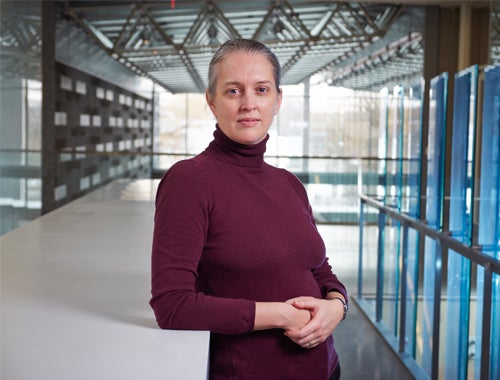
Closing the gap between science and society
Waterloo Philosophy Professor Heather Douglas has been named a Fellow of the American Association for the Advancement of Science (AAAS)

Waterloo Philosophy Professor Heather Douglas has been named a Fellow of the American Association for the Advancement of Science (AAAS)
By Wendy Philpott Faculty of Arts
How should citizens engage with technological innovation? Professor Heather Douglas is dedicated to helping the public, scientists and policy makers work together for innovation that serves society.
“The pursuit of science is an important one, and one that must be done in conjunction with historical and philosophical examinations of science and the science-society relationship,” says Douglas, a professor of philosophy and the Waterloo Chair in Science and Society. “My work centers on this relationship and how it should be understood, particularly for democratic societies.”
Douglas was recently recognized for her work by the American Association for the Advancement of Science (AAAS), the world’s largest general science society, which named her a AAAS Fellow for her contributions to the history and philosophy of science.
“We want societies to be guided by both citizens and technical expertise,” says Douglas. "But how to combine these two threads in a constructive way is an ongoing challenge. The AAAS helps scientists grapple with the responsibilities of doing science within and for complex societies, and I am happy to help with that goal.”
Douglas is a frequent media commentator on science and technology, especially the crucial role of public engagement in research innovation.
Together with 390 new AAAS Fellows, Douglas will be formally recognized at the annual conference held in February 2017 in Boston, which is one of the most renowned science events worldwide. Douglas is the third Waterloo AAAS Fellow. Previous inductees include Arthur Carty, former executive director of the Waterloo Institute for Nanotechnology and Raymond Laflamme, executive director of the Institute for Quantum Computing.
At the AAAS conference, Douglas will deliver two presentations: one on the role values play when scientific advice is provided to policy-makers, the other addresses socially responsible science – with lessons learned from Frankenstein.
“The difficulties of foreseeing the societal implications of scientific research and the allure of technical sweetness (that satisfying feeling when a solution snaps into place), can blind scientists to everything beyond scientific success, as it did for the fictional Dr. Frankenstein,” Douglas wrote in a recent research paper.
Along with her roles within the Department of Philosophy, Douglas has research and teaching affiliations across campus, including with the Water Institute and the Science and Technology in Society Teaching group. She is also the associate director of science and energy policy at the Waterloo Institute for Sustainable Energy (WISE.) Douglas is frequently invited to speak at conferences, policy forums and institutions abroad.

Read more
Meet the five exceptional graduate students taking the convocation stage as Class of 2024 valedictorians

Read more
Meet the 13 exceptional students representing Waterloo’s newest grads

Read more
12 Waterloo students and postdoctoral fellows receive up to $10,000 in funding to develop their green-tech solutions
The University of Waterloo acknowledges that much of our work takes place on the traditional territory of the Neutral, Anishinaabeg, and Haudenosaunee peoples. Our main campus is situated on the Haldimand Tract, the land granted to the Six Nations that includes six miles on each side of the Grand River. Our active work toward reconciliation takes place across our campuses through research, learning, teaching, and community building, and is co-ordinated within the Office of Indigenous Relations.